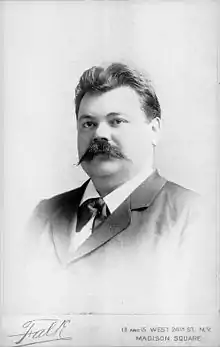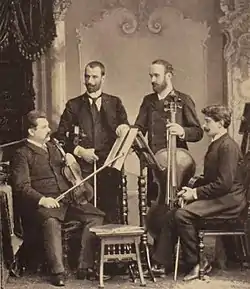Adolph Brodsky
Adolph Davidovich Brodsky (Russian: Адольф Давидович Бродский, Adolf Davidovič Brodskij; 2 April [O.S. 21 March] 1851 – 22 January 1929) was a Russian Empire violinist who later moved to the United States.

He enjoyed a long and illustrious career as a performer and teacher, starting early in Vienna, going on to Moscow, Leipzig, and New York City and finally Manchester. During its course he met and worked with composers such as Tchaikovsky and Elgar.
Biography
He was born into an assimilated Jewish family in Taganrog on the Sea of Azov. His grandfather and father were also violinists. He started music lessons at the age of five, a year after he first played his first violin, which he had bought at a fair. For four years he was taught music in his home town. Aged nine, he gave his first concert in Odessa, where a wealthy person heard him and was so impressed that they provided Brodsky with the funds to study in Vienna. In 1860, he immediately started his studies at the Vienna Conservatory with Joseph Hellmesberger, Sr. In Vienna, Brodsky met fellow student Hans Richter, with whom he became friends. Hellmesberger gave Brodsky the opportunity to play at numerous concerts and invited him to join the Hellmesberger Quartet to play second violin.
From 1866 to 1868 Brodsky was a member of the court orchestra. After ten years in Vienna, he toured for four years giving concerts. (One source says he toured Europe, another says Russia). After the tour he settled in Moscow in 1873. Contrary to what some sources say, he did not study with Ferdinand Laub. In 1875, Brodsky became second professor of violin at the Moscow Conservatory, where he remained for four years.[1]
In 1880 he married Anna Lvovna Skadovskaya in Sebastopol. On 4 December 1881 Brodsky premiered Tchaikovsky's Violin Concerto in D major in Vienna, under the baton of Richter. Brodsky was the dedicatee of the concerto, after Tchaikovsky decided to withdraw the dedication from Leopold Auer, offended that the latter would not to play it unless the composer made certain changes incorporating his unsolicited suggestions. Brodsky had also premiered Tchaikovsky's Sérénade mélancolique in Moscow in 1876. It, too, had been initially dedicated to Leopold Auer, and it, too, had had its dedication withdrawn by the composer (although not reassigned to Brodsky in this case). This was not because of any criticism Auer had made of the Sérénade mélancolique, but was part of Tchaikovsky's reaction to Auer's issues with the Violin Concerto.
Later on, in 1883, after Henry Schradieck moved to the College of Music of Cincinnati, Brodsky was called to fill his position at the Leipzig Conservatoire. He remained in Leipzig until 1891. He formed there his own string quartet, the Brodsky Quartet[2] initially with Ottokar Nováček (2nd violin), Hans Sitt (viola) and Leopold Grützmacher (violoncello).[3][4][5][6] Upon Brodsky's later departure for the United States, Arno Hilf replaced him both as professor in the Leipzig Conservatoire and in the string quartet ensemble.[7]

In October 1891, Walter Damrosch invited Brodsky to become concertmaster of the New York Symphony Orchestra.[8] Brodsky settled in New York City with his wife. In 1894, after three years in the United States, he returned to Europe, with a short stay in Berlin;[3] while he was there Sir Charles Hallé invited him to Manchester to teach at the Royal Manchester College of Music, and direct the Hallé Orchestra. He taught at the College from 1895 until his death, becoming principal in 1896. It was in England that he changed the spelling of his first name to Adolph. Among his pupils at Manchester was Arthur Catterall, who later became a fellow professor at the College. While in Manchester he established his second Brodsky Quartet with Rawdon Briggs, Simon Speelman, and Carl Fuchs.
Brodsky worked on several occasions with Edward Elgar. He admired Elgar and had the opportunity to meet him in February 1900, when Richter introduced them following a performance of the Enigma Variations Richter conducted in Manchester. Carl Fuchs asked Elgar to compose a string quartet for the Brodsky Quartet.[9] Several years later, in 1918, Elgar completed his String Quartet in E minor, Op. 83 and dedicated it to the quartet.[10][11]
In January 1927, as part of a series of events celebrating Elgar's 70 years of life, Elgar conducted the Hallé Orchestra in a performance of his Violin Concerto. Brodsky, then 75 years old and retired, was the soloist that night.[12]
He died on 22 January 1929 in England.[13]
Legacy and honors
While he was in Leipzig, Brodsky held a Christmas dinner, at which Johannes Brahms, Tchaikovsky and Edvard Grieg met. This sparked a friendship between Tchaikovsky and Grieg, who held high esteem for each other. (Brahms and Tchaikovsky, however, never liked or understood each other's music, although they had cordial and respectful relations personally.)[14][15]
Brodsky was honoured with the Norwegian Order of St. Olaf in 1892. During the celebrations of its 50th Jubilee in February 1902, Victoria University conferred upon him an honorary Doctor of Music degree.[5][16]
Brodsky was in possession of a Guarnerius violin, previously owned by Charles Philippe Lafont.[17]
Notes
- The Musical Times 1903, pp. 225–226: "During his sojourn in Vienna Dr. Brodsky became a member of the Imperial Orchestra ... After a residence of ten years in Vienna he made a tour in his native land from 1870–74 ... He subsequently settled at Moscow ... He was never a pupil of Laub as is stated in some biographical notices, though Dr. Brodsky states that Laub had a greater influence upon [his style] than even Hellmesberger ... He accepted the post of a violin professor at the Moscow Conservatorium ... There he remained four years – 1874–78."
- The namesake Brodsky Quartet founded in 1973 was an unrelated later group of players, who chose the name in honour of Adolph Brodsky because the members all came from the Manchester area.
- Ehrlich 1897, p. 19: "[Brodsky was] offered the post of first professor of the violin in the Conservatorium at Leipzig, Schradieck having vacated the office when he went to the United States. Brodsky lost no time in founding a string quartet ... with Hans Becker ... Hans Sitt and Julius Klengel, ... Walter Damrosch ... visited Germany in 1891 ... [and offered Brodsky] the post of leader. This being accepted, Brodsky resigned his Leipzig appointments, went to America ... In 1893 Brodsky left America ... and, after a brief sojourn in Berlin, came to England."
- Lahee 1899, p. 265: "When Schradieck accepted the position of violin teacher at the Cincinnati conservatory, Brodsky was appointed to fill his place at Leipzig."
- Baker & Remy 1919, p. 119: "From 1883-91 he was prof. at the Leipzig Cons., succeeding H. Schradieck. Here he established the Brodsky Quartet (with H. Becker, O. Novaček, J. Klengel) ... In 1892 he was honored with the Norwegian Order of St. Olaf; in 1902 Victoria Univ. conferred upon him the degree of Mus. Doc. (con. c.)."
- Kohut 1900, pp. 84–85: "[A. Brodsky] fühlte auch in Leipzig bald das Bedürfniss, ein Quartett zusammenzustellen, wozu ihm der befreundete, ausgezeichnete Geiger H. Sitt, der die Viola übernahm, sehr förderlich war. Ein Schüler Brodskys, O. Nowazek, übernahm die zweite Violine und Leopold Grützmacher aus Weimar das Cello; später trat J. Klengel an des Letztern Stelle."
- Lahee 1899, p. 357: "[Brodsky] was succeeded in the quartet at Leipzig and at the conservatory by Arno Hilf."
- Lahee 1899, pp. 263–4: "[Brodsky] was engaged by Mr. Walter Damrosch as concert-master for the New York orchestra."
- Moore 1999, p. 299: "Early in February [1900] Edward and Alice were in Manchester again for the second of two Richter performances of the Variations ... At supper after the Manchester concert, [Richter] introduced ... Adolf Brodsky, and his wife ... The Brodskys were becoming keen admirers of Edward's music. So was the cellist of the Brodsky Quartet ... Carl Fuchs. Fuchs extracted from Edward a promise to write something for the cello one day."
- Kennedy 1987.
- Moore 1999, p. 734: "On 24 December [1918] the Quartet was finished. Keeping an old promise from the turn of the century, [Elgar] dedicated it to the Brodsky Quartet."
- Moore 1999, p. 774: "The tributes began [in January] of the birthday year 1927 ... [Elgar] conducted the Hallé Orchestra in a performance of the Violin Concerto which the seventy-five-year-old Adolf Brodsky emerged from retirement to play."
- "Adolph Brodsky Dies. Former Leader With Damrosch Was Head of English Music College". The New York Times. Jewish Telegraphic Agency. January 25, 1929. Retrieved 2015-08-09.
- Baker & Remy 1919, pp. 119–120: "He was on intimate terms with Grieg, Tchaikovsky and Brahms; the last two met each other for the first time at B.'s house in Leipzig."
- The Musical Times 1903, p. 227: [Quoting Brodsky:] "During Tschaikovsky's visit to Leipzig he was repeatedly our guest ... Tschaikovsky had accepted our invitation to dinner on Christmas Day ... he was greatly astonished to find Brahms there. They had never before met ... The personality of Brahms seemed to please him, but [Brahms's Pianoforte Trio in C Minor, Op. 101.] left him quite cold ... Grieg and his wife entered ... Tschaikovsky had never seen them before, but he loved Grieg's music, and he was immediately attracted to him."
- "University intelligence". The Times. No. 36704. London. 1 March 1902. p. 12.
- Lahee 1899, p. 82: "[Lafont] was also the owner of a magnificent Guarnerius violin, which is now said to be the property of Adolf Brodsky."
References
- "Adolph Brodsky". The Musical Times. 44 (722): 225–227. 1 April 1903. doi:10.2307/902923. ISSN 0027-4666. JSTOR 902923.
- Baker, Theodore; Remy, Alfred (1919). "Brodsky, Adolf". Baker's Biographical Dictionary of Musicians (3rd revised ed.). New York: G. Schirmer. pp. 119–120. Retrieved 26 September 2010.
- Ehrlich, Alfred Heinrich (1897). "Brodsky, Adolf". Celebrated Violinists, Past and Present. Translated by Robin Humphrey Legge. London: The Strad. pp. 17–19. LCCN 10008593. Retrieved 26 September 2010.
- Kennedy, Michael (1987). Portrait of Elgar (Third ed.). Oxford: Clarendon Press. ISBN 0-19-284017-7.
- Kohut, Adolf (1900). "II. Die Instrumentalisten". Berühmte israelitische Männer und Frauen in der Kulturgeschichte der Menschheit Lebens- und Charakterbilder aus Vergangenheit und Gegenwart (in German). Leipzig - Reudnitz: A. H. Payne. pp. 84–85. Retrieved 30 September 2010.
- Lahee, Henry Charles (1899). Famous Violinists of To-day and Yesterday. Boston: L. C. Page.
- Moore, Jerrold Northrop (1999). Edward Elgar: A Creative Life. Oxford University Press. ISBN 978-0-19-816366-4.
Thomason, Geoff. "Brodsky, Adolph". The New Grove dictionary of music and musicians https://doi.org/10.1093/omo/9781561592630.013.90000369316
External links
- Bio
- About the encounter of Brahms, Tchaikovsky and Grieg
- Portraits of Adolph Brodsky in the National Portrait Gallery (Project Gutenberg free e-book)